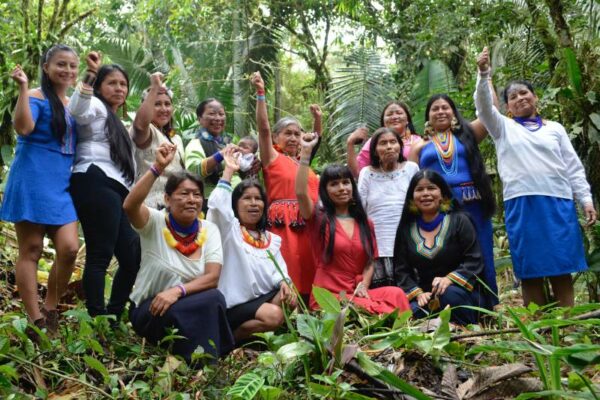Houston – Indigenous leaders from the Peruvian Amazon, environmentalists and human rights groups today called on the Peruvian government to suspend its tendering of oil concessions that threaten to devastate a vast swath of pristine tropical rainforest and the native communities that live there.
They arrived in Houston today to speak out as Perupetro, Peru’s state-owned oil company, launched its 2007 bidding round and roadshow in Houston timed to coincide with the NAPE Expo, the oil prospecting industry’s semi-annual trade show. Perupetro is hoping to attract US energy companies to the highly controversial drilling concessions. In total, Perupetro plans to tender 11 Amazonian blocks, covering approximately 22 million acres of highly biodiverse, intact primary tropical rainforest.
Three of those blocks intrude upon official reserves set up to protect some of the last native peoples still living an isolated and traditional lifestyle anywhere in the Amazon. Three overlap protected areas and nine intrude upon titled indigenous lands. Only one block does not intrude on indigenous lands or protected areas.
In none of the blocks has Perupetro obtained Free, Prior and Informed Consent (FPIC), an internationally recognized human rights benchmark intended to protect the rights of indigenous communities whose lives and lands stand to be affected by extractive mega-projects such as oil drilling.
The new blocks mean that approximately 70 percent of the Peruvian Amazon, one of the largest areas of tropical rainforest anywhere in the world, will be carved into oil concessions. As recently as 2005, before the U.S. Government’s Trade Development Agency gave Perupetro U.S. tax dollars to develop and market its oil concessions, it was under 20 percent.
Huge areas of Peru’s rainforest, such as the Lower Urubamba region in the south and the Corrientes River in the north, and the indigenous communities that live there have already suffered severe impacts as a result of drilling for oil and gas. So far, the Peruvian state has shown little sign that it is willing to learn from these disasters.
Today’s call for suspension of the auction was led by AIDESEP, an umbrella group representing Peru’s many indigenous Amazonian communities, and Peruvian organizations Derechos, Ambiente y Recursos; and Racimos de Ungurahui. Also backing the call are U.S. environmental and human rights organizations, including the Amazon Alliance, Amazon Watch, Environmental Defense, Oxfam America, and Save America’s Forests. All are calling for an immediate suspension of Perupetro’s current bidding round and a firm commitment from the Peruvian government that it will adhere to the spirit and letter of Peruvian law and respect indigenous land rights and the human rights of isolated and vulnerable populations.
Perupetro’s roadshow comes as investors grow increasingly concerned about the high risks of hydrocarbon activities in remote areas of the Amazon. Some oil majors are already giving up because of the huge logistical challenges and the often intense opposition of local communities increasingly aware of the ecological and public health crises caused by oil drilling in other parts of the Amazon.
In December, Occidental Petroleum announced that it was withdrawing from its remaining Amazonian concessions, in Peru, for a range of business reasons including the determined and organized opposition of local communities. ConocoPhillips, meanwhile, has placed its three Amazonian concessions, two in Ecuador and one in Peru, “under review” for similar reasons.
Quotes
Robert Guimaraes, AIDESEP Vice-President: “The Peruvian state should guarantee the territory and land rights of indigenous peoples. Currently, there is a lack of political will. We don’t want petroleum concessions that will impact our lives, environment and culture.”
Legal expert Alberto Barandiaran, President of Peruvian environmental and human rights organization Derecho, Ambiente y Recursos Naturales: “These concessions are the result of a flawed process. Again and again over the last five years, the Peruvian government has issued oil concessions on indigenous lands and protected areas without bothering to meet its basic moral and legal obligations to consult with, and in some cases even inform, local communities, local and regional authorities, and protected areas’ authorities.”
Lily la Torre, Lawyer and Director of Racimos de Ungurahui: “In compliance with international human rights legal instruments and out of respect for basic human decency, these concessions should not be allowed in areas inhabited by isolated indigenous peoples. These highly vulnerable populations have no immunity to many diseases introduced by outsiders and their physical as well as cultural survival is threatened by these concessions.”
Petroleum Engineer Bill Powers, of E-Tech International, a non-profit engineering consultancy: “Investing in upstream activities in the Amazon is high risk. Even if successful bidders use best practices, their presence will create conflict with local communities, who are not given a voice in the process and are strongly opposed to drilling on their lands. Peruvian oil and gas operations have been ruled by good-old-boy ways for too long, unchecked by a weak and corruptible government. It is time for a new approach.”
For a fact sheet and map about controversial concessions in Peru, click on www.amazonwatch.org/PE07.pdf
For background on the struggle of indigenous peoples to protect their rainforest homelands in the Amazon, visit www.amazonwatch.org.













